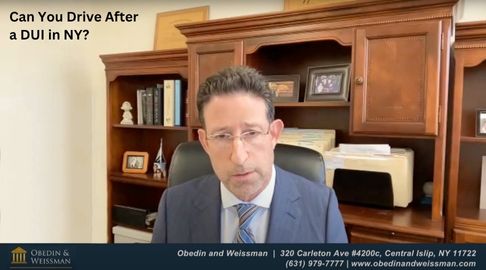In New York, getting arrested for a DUI (Driving Under the Influence), legally referred to as DWI (Driving While Intoxicated), triggers an immediate impact on your ability to drive. Whether you’ll be able to drive again—and how soon—depends on several legal procedures and administrative decisions that follow the arrest. According to Ira Weissman, a veteran DWI defense attorney with Obedin and Weissman in Central Islip, Suffolk County, “Your license is going to be suspended the very first time you go to court.”
License Suspension Starts at Arraignment in New York
Once you’re arrested and brought to court for arraignment, your driver’s license is suspended right away. This isn’t a punishment yet—it’s a precautionary measure under New York State law. The suspension happens whether you’re ultimately convicted or not. The idea is to ensure that individuals charged with DWI are temporarily off the road until their case progresses through the legal system.
This suspension applies to both New York State drivers and out-of-state license holders. However, for non-residents, the judge suspends your driving privileges within New York, not your actual license.
What’s Next: The Hardship License
After your license is suspended at arraignment, you may be eligible to apply for what’s called a hardship license. This is a restricted form of driving privilege granted only to those who can demonstrate a compelling need to drive—for example, to get to and from work or school. As Mr. Weissman points out, “You may be eligible for a hardship license if we can prove that you’re the only driver in the household and you have no other means to get to work.”
Keep in mind that the hardship privilege is narrow. It’s granted solely at the discretion of the judge and only after your attorney presents convincing evidence that no viable alternative transportation exists. The hearing for a hardship license generally occurs within a few days of your arraignment.
Chemical Test Refusals: A Different Path
If you refused to take a chemical test, such as a breathalyzer, your license will be suspended immediately and a Department of Motor Vehicles (DMV) refusal hearing will be scheduled. This hearing usually takes place within 15 days and determines whether your refusal violated New York’s implied consent law. If it did, your license may be revoked for one year—separate from the court’s decision about the criminal charge.
How Long Until You Can Drive Again?
If you’re ultimately convicted of a DWI, your license will likely be revoked for a minimum of six months for a first offense. However, after a certain waiting period and depending on your driving record and whether you meet certain criteria, you may be eligible for a conditional license through New York’s Drinking Driver Program (DDP). This program allows limited driving privileges, such as commuting to work or medical appointments.
Why Legal Guidance Is Crucial When Dealing With a DUI Charge in NY
The difference between getting back on the road quickly and facing a long-term suspension often comes down to having experienced legal representation. “Your best option is to get a lawyer involved right away,” Mr. Weissman explains. A skilled DWI attorney can not only help you protect your legal rights but also guide you through hardship or conditional license options and prepare for DMV hearings.
Final Thoughts
Being arrested for DWI in New York triggers an immediate and serious consequence: you likely won’t be able to legally drive the next day. Whether you’ll qualify for a hardship or conditional license depends on your situation and your attorney’s ability to advocate for you.
If you’ve been arrested for DWI in New York, don’t navigate the process alone. Call Obedin and Weissman. We are available 24/7 to answer your questions and be in court with you the very next day.


